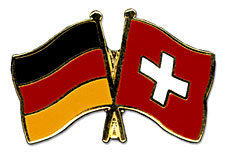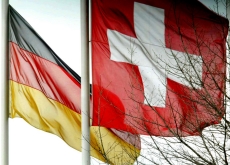Swiss struggle to accept German migrants

The Germans love Switzerland. According to a survey by the private comparis.ch company, 43 per cent of them could imagine coming to work in Switzerland.
And quite a few do indeed make the move: there are currently more than 200,000 living in Switzerland – 0.25 per cent of Germany’s total population. In the second quarter of 2007 the number rose by 12 per cent, the Federal Statistics Office reported.
They share – more or less – the same culture as the German-speaking Swiss, they have plenty to offer. But the love is not necessarily reciprocated.
When it comes to neighbours of unequal size, whether they are cities, regions, countries or continents, the smaller one regards the bigger as cold, arrogant and materialistic, while seeing itself as warm and sensitive, as Swiss German commentator Peter von Matt told the Tages-Anzeiger newspaper.
“When they speak of the people of Zurich, the Bernese are like a warm oven speaking of an iceberg,” he said. The same phenomenon often colours the Swiss view of the Germans. “But this is as common as sneezing, and quite harmless.”
The Germans are better at football. Switzerland has not beaten them since 1956. The latest debacle came on Wednesday, when Germany hammered Switzerland four-nil. That helps to fuel hostility, which is often picked up in tabloid headlines.
Germany is Switzerland’s biggest economic partner by far, and its most important export market. The Swiss have no qualms about promoting their country and its advantageous tax system to attract German companies. A number of German firms have relocated to Switzerland, and have created jobs which contribute to its growth.
Wages, weather and mountains
The comparis study found the Germans they polled recognised persuasive arguments to move to Switzerland: not only that pay is better and taxes lower than at home, but also that the country is beautiful and there is no language barrier.
The study questioned 1,000 Germans over the age of 18 across the country. It found that people under the age of 30 and those with a good educational level were most likely to think of emigrating.
The proportion of Germans in Switzerland is particularly high among hospital doctors, engineers, university professors and in management. The agreement with the European Union allowing EU and Swiss citizens to work in each other’s countries is good for Switzerland’s gross national product.
Divided by a shared language
Yet many Germans encounter a lot of problems when they first come to Switzerland, according to Werner Koller, author of the study “Deutsche in der Deutschschweiz” (Germans in German-speaking Switzerland). “The differences do not have to be very great before you are treated as a foreigner in Switzerland,” he commented.
At first sight there would seem to be no reason why German immigrants should not integrate easily. They share much of the same cultural background. When it comes to German lessons in school, their children have a distinct advantage over their Swiss contemporaries who speak Swiss German at home and for whom “written German”, or “High German” is a foreign language.
But this is precisely one of the problems. What to a German is a perfectly normal way of speaking sometimes grates on Swiss ears: they may come over as rude or aggressive. It’s something like the difference between “Give us another beer” and “I’d like another beer, please.”
Many Swiss don’t like speaking High German – it isn’t their normal spoken language. But Swiss German, which has a number of regional variations, has never been a written language. This means that outsiders tend to look down on it, as “merely” a dialect.
It is different enough to be incomprehensible, at least initially, to Germans, who tend to feel excluded when the Swiss insist on using it with them.
The problems Germans often feel arise on the one hand because many Swiss expect the Germans to try to adapt linguistically. But at the same time, they resent German encroachment. “Germans shouldn’t speak Swiss German, because the language is a way for the Swiss to keep their distance from the ‘big brother’,” says Koller.
Nothing new under the sun
There is nothing new about this uneasy relationship. Back in 1855 Friederich Theodor Vischer, a professor working in Zurich, wrote: “As a German you always have the feeling that the ground could give way at any time when you are mixing with the Swiss, that they could come up with some anti-German remark.”
And the eminent Swiss writer, Gottfried Keller commented in 1856: “How terrible, the number of learned people there are walking around Zurich these days. One almost hears more High German, French and Italian being spoken that our good old Swiss German.”
swissinfo, based on an article in German by Andreas Keiser
At the end of 2007, 20.7% of Switzerland’s resident population of about 7.5 million people were foreign passport holders.
At more than 200,000, Germans account for 12.9% of all foreigners. They are the second largest group after the Italians.
In 2007 some 40,000 German nationals moved to Switzerland, while about 10,000 left.
In 2007 1361 Germans obtained Swiss citizenship, while in 2006 the figure was 1134.
Since August 2007 a change in German law has allowed dual citizenship. As a result, there has been a rise in the number of Germans applying for Swiss nationality.

In compliance with the JTI standards
More: SWI swissinfo.ch certified by the Journalism Trust Initiative











You can find an overview of ongoing debates with our journalists here . Please join us!
If you want to start a conversation about a topic raised in this article or want to report factual errors, email us at english@swissinfo.ch.